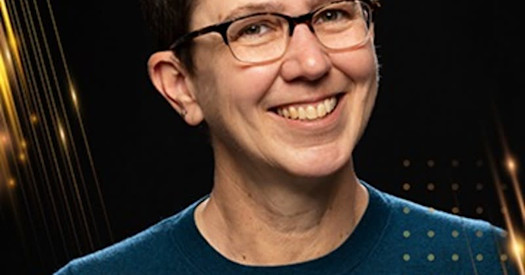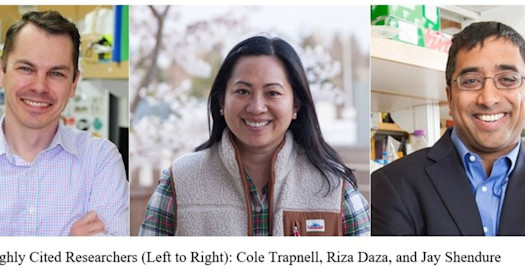
Dr. Alison Paquette: "If you can intervene in childhood health outcomes, those impacts can persist for a lifetime."
BBI: Can you tell us about how you got involved in your area of research within precision medicine?
Dr. Paquette: I was always really interested in biochemistry and genetics, but I became especially excited about how to apply this to children’s health after I did an internship with the U.S. Environmental Protection Agency. While there, I learned about how infants and children are uniquely vulnerable to environmental chemicals, and how those influences can persist into adulthood. I saw this time period as actionable, because if you can intervene in childhood health outcomes, those impacts can persist for a lifetime.
I decided to complete my PhD along these lines, working with Dr. Carmen Marsit, who looks at the developmental origins of health and disease, especially how the period of in-utero development affects childhood health. My research has been largely focused on the placenta and its long-term impacts on fetal health. This has led to a series of interrelated projects with Seattle Children's Research Institute (SCRI) and the ECHO PATHWAYS consortium within the UW, mentored by an expert in children’s health and phthalate exposure, Dr. Sheela Sathyanarayana.
BBI: How did you decide to design projects to assess phthalate exposure on placentas?
Dr. Paquette: Dr. Sathyanarayana co-leads a large cohort study with the Environmental Influences on Child Health Outcomes, or ECHO program, with over 1,000 placental samples with Omics data. Within these samples we found links between placental gene expression and specific metabolites of different phthalate compounds. This work led us to ask a further question: “Could we treat placental cells with phthalates and see similar changes in gene expression?” Working with Dr. Dave Beier at SCRI and Dr. Les Myatt at Oregon Health & Science University, we treated placental cells with phthalate metabolites and saw many changes in placental gene expression. We were able to treat placental cells at multiple stages of placental development, and even see different changes to phthalate exposure at different developmental stages.
This led us to apply for a BBI pilot grant last year. I wanted to use a technology developed by the Fred Hutch called CUT&RUN (Cleavage Under Targets and Release Using Nuclease) that allows you to map transcription factor gene interactions. I was initially attracted to this technology, because phthalates are known to disrupt specific transcription factors involved in growth and development, such as the androgen receptor and estrogen receptor. I thought we could use this technology to test if the changes in gene expression were related to altered regulation by these specific transcription factors at a level that we could not see in a human cohort study.
BBI: How is the BBI Pilot Grant project going so far?
Dr. Paquette: It is going well! We have found transcription factors that are enriched for these changes in gene expression, and we have seen results that are complementary to changes we saw in the human studies. We have used this information to select the transcription factors that we are interested in, and are starting to test these in placental cell lines. We received the BBI grant in January, and we are optimistic. It is such interdisciplinary work, and is a new way of asking a question about a known mechanism. If this works, we can get a better understanding of exactly how phthalates may be causing specific changes in gene expression that we have seen in the human studies.
Previous groups have shown that phthalates are endocrine disrupting chemicals, but we haven’t yet mapped exactly how they alter expression across the genome. This study has promise to provide better resolution on this known issue affecting fetal health.
BBI: You mentioned that this is interdisciplinary work, which comes with its own benefits and challenges. How has it worked for you?
Dr. Paquette: I have always been drawn to interdisciplinary work. For my PhD, I was in a toxicology lab group, but my post-doc was more computationally driven. The approaches people use in different fields to ask similar questions are very different. The work I have done with ECHO PATHWAYS is driven from an epidemiological perspective, which comes with its own way to frame questions. Each group does rigorous science, and it is fascinating to have them work together and borrow best approaches from each other.
Challenges across different fields, and dealing with many moving parts can be difficult. Logistically moving samples between labs, handling variation in data, and transferring data sets between different institutions come with its own challenges, but it is worth the extra trouble when you answer a question in a unique way no one has tried before.
BBI: Where do you see this work potentially going next?
Dr. Paquette: A lot of my work has centered around looking at placental changes related to preterm birth, trying to understand what is different in placentas of infants that are spontaneously born preterm. Epidemiological studies have shown associations among a number of different environmental exposures, including phthalates, and preterm birth. But, there is not an understanding of exactly how these chemicals do their damage. My hope is that by seeking basic understandings of these mechanisms, we could one day make lifestyle or policy recommendations to modify risk factors or exposures that increase incidence of preterm birth.
Read more about Dr. Paquette’s research into placental phthalate exposure here.
__Check back in soon for more chats with BBI members from our partner institutions. Get an inside view of their work and where they think the field of precision medicine is heading. __


